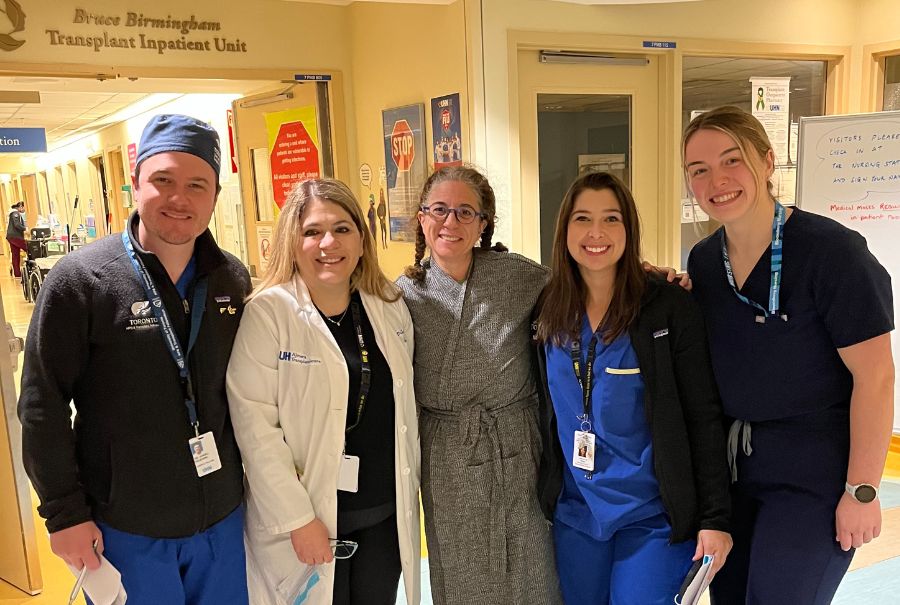Patrice Wedderburn, Geriatric Emergency Management Clinical Nurse Specialist at University Health Network.
The Emergency Departments (EDs) at Toronto General and Toronto Western hospitals are improving the patient experience for older adults with simple interventions that leave a big impact. Each ED is equipped with a Comfort Cart – also known as a Geri Cart – that is stocked with items that reduce stress and boredom, facilitate communication, and increase comfort for older patients when they visit the hospital for urgent care.
Dr. Sam Sabbah, Medical Director of Emergency Medicine at University Health Network (UHN), recalls a female patient living with dementia who was admitted to the Emergency Department at Toronto Western for having pneumonia.
“She did not speak English, was agitated, had been moaning, and continuously called out for her family,” says Dr. Sabbah. “Then one of the nurses suggested using a baby doll from the Comfort Cart – and it was like magic. Within minutes, the patient held the doll tight in her hands, rocked it and completely calmed down. I can only imagine how distressed she was, and this seemingly simple intervention had a huge impact on her experience, the experience of other patients around her, and the working conditions of our staff.”
The dolls, which are available in different skin tones, are ideally suited for patients living with advanced dementia because “the patient will revert to a place and time where they were a caregiver for a child,” says Patrice Wedderburn, Geriatric Emergency Management Clinical Nurse Specialist. “When they’re in that state of mind, instead of trying to orient them out of that state – which would cause them more distress – we will live in the experience with them and work with the patient to show us what they need. At the same time, dolls help to provide a distraction from an environment that can be overstimulating.”
In addition to the therapeutic baby dolls, the Comfort Carts include a variety of other items, such as reading glasses, magazines, tablets, word searches, colouring books, crayons, sleep masks, noise cancelling headphones, and sensory blankets to occupy patients prone to pulling at their I.V. tubes, to name a few.
Supported by donors and UHN’s Patient Partner Program
The carts have been on-site since February 2022 and were created as part of UHN’s Geriatric Emergency Department Initiative (GEDI), a new initiative made possible by donors and aimed at improving care, experiences and outcomes for older adults visiting UHN’s EDs. The Comfort Carts were developed and implemented by a multidisciplinary team that includes GEDI leadership, Geriatric Emergency Management Clinical Nurse Specialists, social workers, physicians, physiotherapists, registered nurses, UHN’s Patient Partner Program, which is one of the six pillars of Patient Experience & Engagement at UHN, and others.
“When you are afraid and in pain, you don’t have the patience to answer questions or follow instructions. You are worried that you may even die,” says Santa Cuda, Patient and Caregiver Partner. The Comfort Carts “may seem inconsequential, but they help with your capacity to think and understand by calming you down, and with reducing your anxiety so that you can clearly communicate with your clinician. Fabulous!”
Patient Partners support meaningful communication between patients and caregivers with hospital staff and leaders to improve the quality and safety of care. The Comfort Carts are an example of the ways in which the Emergency Medicine and Patient Experience & Engagement programs at UHN continue to provide leadership and support to patients at every point of their care journey. The carts will continuously be improved upon based on the ongoing feedback from patients, families, caregivers and staff.
Improved health outcomes and communication
For Wedderburn, the cart’s impact is greatest for preventing or delaying patients from experiencing delirium, which is a confused and altered mental state that can occur rapidly, is accompanied by a decrease in the ability to think, communicate or mentally function, and can be triggered by a change in environment.
“Delirium is one of the biggest concerns for patients over age 65, especially if they have a cognitive impairment. It represents an acute brain failure, and if we don’t catch it quickly, it could result in increased health issues, hospital stay and mortality,” she says, adding that simply using the whiteboard in the Comfort Cart to write down the date, time and location will help patients orient to their present-day reality and delay or prevent delirium.
Two of UHN’s Geriatric Emergency Management Clinical Nurse Specialists, Wedderburn and Jane Ren, agree that one of their favourite items in the cart are the pocket talkers, which connect to in-ear headphones that the patients use. They allow staff to communicate into a microphone to patients with hearing loss, as opposed to shouting in the busy Emergency Department and, in the process, improve the staff experience along with that of the patient.
Another excellent communication tool is the “communication chart, which provides commonly used words in 27 languages for staff to communicate with non-English speaking patients,” says Ren. “I have used the communication chart and the pocket talker the most, given that many of our older patients have a hearing impairment. They have been so convenient and stopped the struggle I had when communicating with those unable to hear properly.”
Additionally, the Comfort Cart inventory also adhere to infection prevention and control practices. There are disposable covers for the tablets and headphones, and the items in the cart can be sanitized, like the dolls, or tend to be single use, like the reading glasses.
The reading glasses, along with the newspapers, are the most popular items among Wedderburn’s patients at Toronto Western, she says. Ren adds that the patients she cares for at Toronto General most enjoy colouring, reading and playing the games and, for improved nighttime quality of sleep, the sleep masks and earplugs are a big hit.


